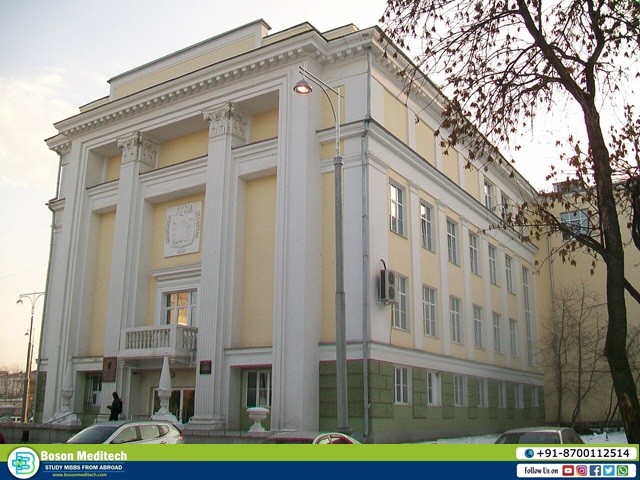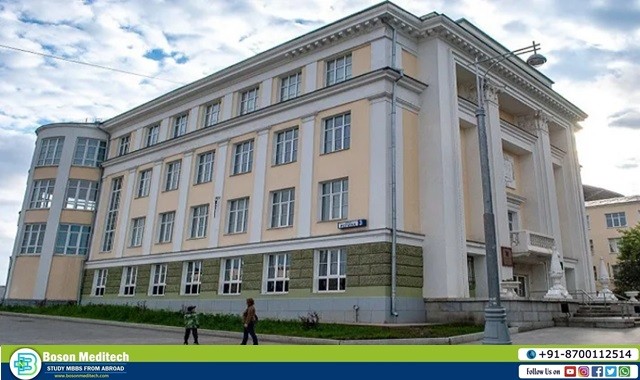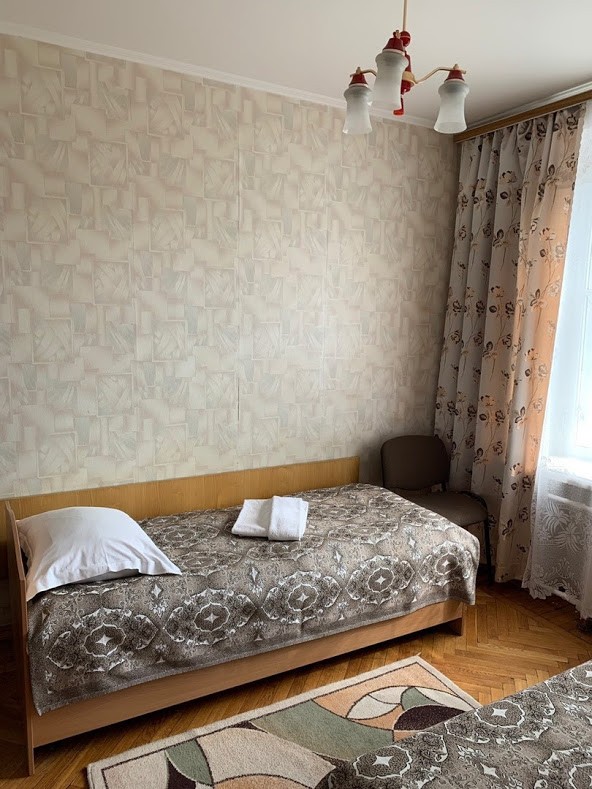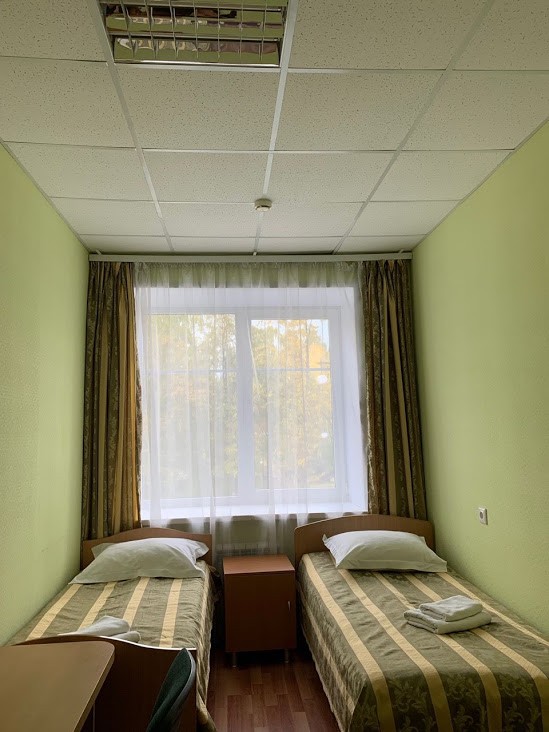
Ural State Medical University, established in 1930, stands as a prominent hub of scientific and educational excellence for medicine study in Russia. It hosts a diverse community of approximately 5000 undergraduate and postgraduate students engaged in medicine degree programs spanning Preventive Medicine, Dentistry, Pharmacy, Nursing, Social Work, and Clinical Psychology. The institution also offers internship programs in 31 specialties, residency programs in 61 specialties, and postgraduate studies in 42 specialties.
The degree programs in General Medicine and Pediatrics hold accreditation from the Agency of Public Education Quality Management and Career Development. These programs, alongside Dentistry and Preventive Medicine, are recognized among the top educational initiatives in innovative Russia.
Ural State Medical University 2024-25 Highlights
| Location | Sverdlovsk Oblast, Russia |
| University Type | Public |
| Year of Establishment | 1931 |
| Type | Public |
| Recognition | NMC, ECFMG and WHO approved |
| Eligibility | 50% in Physics, Chemistry and Biology for General Category and 40% for Others |
| Intake for MBBS | September – October |
| Course Duration | 6 Years |
| NEET Qualification | Mandatory |
| IELTS/TOFEL | Not Required |
| Medium of Teaching | English |
| World Ranking | 1255 |
| Country Ranking | 15 |
| Annual Tuition Fee | 2,65,000 Ruble (approx) |
| Hostel Free | 8500 Rub yearly for Govt Hostels |
| Living Cost | 150-200 USD |
Established in 1930 as the Sverdlovsk State Medical Institute, the “Ural State Medical University” under the Ministry of Health of the Russian Federation has evolved into a comprehensive institution dedicated to medical education and research. Presently, the university accommodates a thriving community of over 7,000 students, including undergraduates, interns, residents, graduate students, and trainees.
The academic landscape is structured across 58 departments, spanning 8 faculties and departments. Learning experiences are enriched through partnerships with 40 clinical bases strategically located in premier medical institutions, research facilities, Rospotrebnadzor bodies and institutions, city and regional pharmacies, and the university’s own dental clinic. This clinic stands out for its state-of-the-art facilities, boasting cutting-edge equipment that contributes to a high standard of medical care and research.
Notably, numerous alumni of the institute have risen to significant positions as statesmen and leaders in healthcare and medical science. Distinguished individuals include Fedor Galaktionovich Zakharov, Maria Dmitrievna Kovrigina, Vasily Vasilyevich Parin, Boris Tikhonovich Velichkovsky, Arkady Nikitich Vorobyov, Vasily Nikolaevich Klimov, Vladimir Ivanovich Starodubov, Angelina Konstantinovna Guskova, Vasily Lazarev Grigoryevich, Uyba Vladimir Viktorovich, Khalfin Ruslan Albertovich, Nikonov Boris Ivanovich, Yastrebov Anatoly Petrovich, and Kutepov Sergey Mikhailovich. Their success reflects the university’s commitment to nurturing accomplished professionals in the field of medicine and related disciplines.

Ural State Medical University Official Website
Ural State Medical University Address:
Ulitsa Repina, 3, Yekaterinburg, Sverdlovsk Oblast, Russia, 620014
Ural State Medical University Fee Structure 2024-25
| 1st Year | 2nd Year | 3rd Year | 4th Year | 5th Year | 6th Year | |
| Tuition Fees | 2,48,000 Rubles | 2,48,000 Rubles | 2,48,000 Rubles | 2,48,000 Rubles | 2,48,000 Rubles | 2,48,000 Rubles |
| Hostel | 12,000 Rubles | 12,000 Rubles | 12,000 Rubles | 12,000 Rubles | 12,000 Rubles | 12,000 Rubles |
| Total | 2,60,000 Rubles | 2,60,000 Rubles | 2,60,000 Rubles | 2,60,000 Rubles | 2,60,000 Rubles | 2,60,000 Rubles |
| Total in INR | 2,32,000 INR | 2,32,000 INR | 2,32,000 INR | 2,32,000 INR | 2,32,000 INR | 2,32,000 INR |
Total Budget of MBBS Study at Ural State Medical University, Russia
The total budget of studying medicine at Ural State Medical University for 6 years is 27-30 Lakhs. This amount includes the tuition fee, hostel charges, food and mess, living expenses and other expenses of the student on an average. The amount may vary however, from student to student.

Advantages of Studying MBBS at Ural State Medical University:
Advanced Educational Facilities:
The university offers state-of-the-art facilities to support the educational process, including a Center for Practical Skills and a well-equipped Central Research Laboratory.
A library with a substantial collection, 90% of which comprises educational literature published within the past 5-10 years, ensures students have access to up-to-date resources.
Research and Academic Support:
The institution boasts a Scientific Society of Young Scientists (NOMUS) and a Scientific and Educational Center named “Perspektiva,” fostering an environment of research and academic exploration.
The university encourages extracurricular activities through the Office of Extracurricular Activities, which encompasses the Union of Students and Postgraduates, a volunteer movement association, a council of hostels, the Center for Leisure and Aesthetic Education, and a sports club.
Diverse Extracurricular Opportunities:
The extracurricular activities available, including sports facilities, sports grounds, and a ski base, contribute to a vibrant student life, allowing individuals to pursue personal, creative, and career ambitions.
Exceptional Faculty:
The staff at Ural State Medical University is a crucial factor in ensuring the quality of education. The university takes pride in its teaching staff, which includes a corresponding member of the Russian Academy of Medical Sciences, honored scientists, honored doctors, and recipients of prestigious awards.
A notable 23% of the teaching staff hold doctorate degrees, a remarkable figure among medical universities in the country.
Outstanding Alumni Achievements:
Many graduates have attained prominent positions as statesmen, heads of medical institutions, and renowned scientists in Russia and abroad. Notable alumni include ministers of health, deputy ministers, pilot-cosmonauts, and academicians of the Russian Academy of Medical Sciences.
International Collaborations and Impactful Research:
Ural State Medical University is recognized as a center of medical science, actively engaging in joint research with esteemed institutions and organizations worldwide.
Collaborations extend to the Ural Branch of the Russian Academy of Sciences, federal research institutes, business enterprises, and international institutions, fostering innovation and contributing to the development of the region.
Cutting-edge Medical Contributions:
University scientists actively contribute to the development, implementation, and improvement of modern diagnostic and treatment methods in the healthcare sector. This includes innovations in minimally invasive and robot-assisted surgeries, brachytherapy, molecular genetics techniques, nanotechnologies in dentistry and pharmacy, among others.
Mission-driven Development Strategy:
The university’s mission, “For the benefit of the health of the Urals – to study, heal, educate!” underscores its commitment to societal well-being through education, healthcare, and research. This mission guides the institution’s policy and development strategy.
Scientific Medical Library at Ural State Medical University:
The Scientific Medical Library at Ural State Medical University, named after Professor V.N. Klimov, has been an integral part of the institution since its inception in 1931, coinciding with the commencement of classes at the medical faculty of the Sverdlovsk State Medical Institute.
Key Features:
Diverse Collection:
The library’s collection encompasses educational, scientific, reference, and informational publications, both in print and electronic formats.
Specialized materials cover a wide range of medical disciplines, including general medicine, medical and preventive care, pediatrics, dentistry, pharmacy, nursing, and social work.
Historical Significance:
Founded in 1931, the library has played a crucial role in supporting the academic and research endeavors of the university over the years.
The library has witnessed the evolution of medical education and research at the university since its early days.
Library Fund Volume:
The library boasts a substantial collection with a volume of 597,000 copies of publications, ensuring that students and faculty have access to a wealth of resources to support their academic pursuits.
Academic Council Recognition:
The library’s importance is underscored by the decision of the Academic Council of Ural State Medical University on May 21, 2010, officially naming it after Professor V.N. Klimov.
This recognition reflects the library’s pivotal role in supporting the academic mission of the university and its commitment to excellence in medical education and research.
The Scientific Medical Library stands as a testament to the rich history and dedication to academic excellence at Ural State Medical University, providing a vital resource for students, faculty, and researchers in the medical field.
Student Life at Ural State Medical University:
Other Educational Activities:
Department Visits for Preparatory Courses:
The Dean’s office organizes visits to various departments of Ural State Medical University, including anatomy and physical education, to familiarize preparatory course students with the university’s structure and activities. This aims to facilitate their adaptation and introduce them to their future educational environment.
Cultural and Educational Excursions:
Joint preparation and participation in state and national holidays, coupled with visits to historical sites, contribute to a rich cultural and educational experience for students.
The university fosters a sense of community by organizing excursions and cultural activities that enable students to explore Russian customs and traditions.
Student’s Day Celebrations:
The Dean’s office collaborates with the Union of Students and Postgraduates of USMU to organize cultural and creative events dedicated to Student’s Day. These events include intellectual competitions, showcasing talents, and broadening horizons for both international students and those in preparatory courses.
Russian Maslenitsa Festival:
The celebration of Russian Maslenitsa involves representatives from the Dean’s office, international students, and the Union of Students and Postgraduates. This festival provides a platform for introducing Russian customs, folk games, and sports competitions, fostering cultural exchange.
Sports and Leisure: Ural State Medical University Official Website
Inclusive Sports Participation:
International students actively engage in physical education, sports competitions, and various creative events, becoming integral members of student social life.
Collaboration with Russian students in competitions, attendance of theaters and exhibitions, and the organization of recreational evenings contribute to a vibrant multicultural atmosphere.
International Training and Adaptation Center:
Supervised by the Dean’s office of international students, this center plays a crucial role in assisting international students in adapting to the new educational and life conditions. It ensures their full participation in the scientific, cultural, and social aspects of university life.
Tutor Support and Cultural Exchange:
School of Tutors:
The establishment and organization of a school of tutors provide support for international students, helping them overcome language barriers, adapt to the new environment, and organize their leisure time.
Intercultural Communication:
Regular meetings between Russian tutors and international students foster intercultural communication, where they engage in various activities such as playing musical instruments, singing, dancing, and discussing student-related issues.
Russian Club:
The Russian Club serves as a platform for sharing insights into Russian culture, customs, and traditions. It facilitates discussions on life and study experiences, encouraging international students to share their perspectives on their countries.
The club organizes celebrations of national holidays, events highlighting the history and culture of different countries, and activities aimed at developing socio-cultural skills among students.
International Training and Adaptation Center:
Student Empowerment:
The center is established to ensure students’ rights to participate in the management of the educational process, address important life issues, and promote social activity and initiatives among both Russian and international students.
Overall, the student life at Ural State Medical University is characterized by a diverse range of educational, cultural, and sports activities, fostering a dynamic and inclusive environment for students from various backgrounds.
Hostel Facilities at Ural State Medical University:
 The campus at Ural State Medical University is an integral component of the institution, serving as temporary residence for nonresident students, full-time residents, and applicants during entrance examinations. The following features characterize the hostel facilities:
The campus at Ural State Medical University is an integral component of the institution, serving as temporary residence for nonresident students, full-time residents, and applicants during entrance examinations. The following features characterize the hostel facilities:
Accommodation for Foreign Citizens:
Foreign citizens admitted under interstate agreements share student dormitories with Russian students, fostering a sense of community and cultural exchange.
Optimal Living Conditions:
The campus is dedicated to creating optimal living conditions in the dormitories to ensure the well-being and comfort of its residents.
Efficient Hostel Operation:
Rational operation of hostels is a priority, emphasizing maintenance, cleanliness, and efficient management.
Event Organization:
The campus organizes events related to settlement, accommodation, educational processes, and social activities to enhance the overall student experience.

Educational and Social Support:
The campus plays a crucial role in organizing the educational process, providing social work, and offering socio-pedagogical support to facilitate the adaptation of students.
Dormitory Living:
Diverse Student Population:
Over 1,600 students from Ural State Medical University call the campus home, fostering student self-government bodies and opportunities for self-realization, leadership development, and organizational skills.
Room Configurations:
Students reside in rooms accommodating 2-4 individuals, providing a balance between communal living and personal space.
Study Halls and Amenities:
Each building features study halls for students to engage in self-training during their free time, promoting academic engagement.
Living rooms are equipped with furniture and essential amenities, contributing to a comfortable living environment.
Shared Facilities:
Shared kitchens on each floor and showers on the ground floors of the buildings contribute to the communal living experience, fostering interaction and a sense of community among residents.
Student Councils:
Each dormitory has a self-governing body known as the student council. This council coordinates the activities of floor elders, organizes self-service work within the dormitory, and plans various events to enhance the overall living experience.
Medical Care and Services:
The campus, as a structural subdivision of the university, provides therapeutic and diagnostic medical care to students. It also organizes and conducts preventive, anti-epidemic, and sanitary-hygienic measures, prioritizing the health and well-being of its residents.
In summary, the hostel facilities at Ural State Medical University prioritize creating a supportive and comfortable living environment, promoting student engagement, and ensuring the overall well-being of its diverse student population.

About The Sverdlovsk City
Sverdlovsk Oblast is a federal subject (oblast) located in the Ural Federal District of Russia. Here are some key details about Sverdlovsk Oblast:
Capital: The administrative center of Sverdlovsk Oblast is Yekaterinburg, which is also the fourth-largest city in Russia. Yekaterinburg is a major industrial and cultural hub and serves as the economic and administrative center of the region.
Geography: Sverdlovsk Oblast is situated in the eastern part of the Ural Mountains, which form a natural boundary between Europe and Asia. The oblast has diverse landscapes, including mountains, forests, and plains.
Economy: The region has a diverse and robust economy, with key industries including metallurgy, machinery, chemicals, and mining. Yekaterinburg, in particular, is known for its industrial and economic significance.
Education and Culture: Sverdlovsk Oblast is home to several educational institutions and cultural landmarks. Yekaterinburg, being a major city, has numerous universities, museums, theaters, and historical sites, contributing to the cultural and intellectual life of the region.
History: The oblast has a rich history, and its development is closely tied to industrialization and the growth of the Trans-Siberian Railway. Yekaterinburg, in particular, is known for its historical significance, including being the place where the last Russian Emperor, Nicholas II, and his family were executed in 1918.
Natural Resources: Sverdlovsk Oblast is rich in natural resources, including minerals such as iron ore, copper, and gold. The presence of these resources has played a significant role in the development of the region’s mining and metallurgical industries.
Tourism: The region attracts tourists with its natural beauty, historical sites, and cultural attractions. The Ural Mountains offer opportunities for outdoor activities, and Yekaterinburg’s historical sites, including the Church on the Blood (built on the site of the Romanovs’ execution), are popular tourist destinations.
Transportation: Sverdlovsk Oblast is well-connected by transportation networks. Yekaterinburg, as a major city, has an international airport, and the Trans-Siberian Railway passes through the region, contributing to its accessibility and connectivity.
Population: As of my last knowledge update in January 2022, Sverdlovsk Oblast had a diverse population. Yekaterinburg, as the largest city, is a cultural melting pot with residents from various ethnic backgrounds.
Cost of Living:
The cost of living in Sverdlovsk Oblast, like in any region, can vary depending on factors such as the city or town, lifestyle, and personal spending habits. Here are some general considerations regarding the cost of living in Sverdlovsk Oblast, focusing on its capital city, Yekaterinburg:
Accommodation: The cost of housing can vary based on factors such as location, size, and amenities. In Yekaterinburg, rental prices for apartments may range from moderate to relatively high, with prices generally being more affordable compared to major cities like Moscow or St. Petersburg.
Utilities: The cost of utilities, including electricity, heating, cooling, water, and garbage, is typically reasonable compared to Western European countries. However, it can vary based on individual consumption and the size of the accommodation.
Food: Grocery prices are generally affordable, especially if you buy local products. Eating out in restaurants or cafes may vary like 2 USD -5 USD in cost depending on the establishment and the type of cuisine.
Transportation: Public transportation in Yekaterinburg is available and relatively affordable. The cost of a monthly transportation pass or individual tickets can contribute to overall living expenses like 8 USD.
Healthcare: Healthcare expenses can vary based on individual needs and whether individuals have private health insurance. Russia has a public healthcare system, and some residents may also opt for additional private insurance coverage.
Entertainment and Leisure: The cost of entertainment and leisure activities, such as going to the cinema, theater, or cultural events, can vary. Yekaterinburg offers a range of cultural and recreational opportunities.
Advantages of MBBS in Russia For Indian Students
Studying MBBS (Bachelor of Medicine, Bachelor of Surgery) in Russia offers several advantages, making it an attractive option for international students. Here are some key advantages:
Affordability: Tuition and living expenses in Russia are generally lower than in many Western countries. This makes pursuing MBBS in Russia a cost-effective option for many students.
World-Class Education: Russia has a long-standing tradition of excellence in medical education. Many universities, including those offering MBBS programs, are recognized globally for their high academic standards and rigorous curriculum.
English-Medium Programs: Several Russian universities offer MBBS programs in English, making it accessible to international students who may not be fluent in Russian. This facilitates a smoother learning experience for students from different linguistic backgrounds.
International Recognition: Medical degrees obtained from Russian universities are recognized by major medical councils and organizations worldwide. This recognition enables graduates to practice medicine in various countries after fulfilling additional licensing requirements.
Cultural Diversity: Studying in Russia provides students with exposure to a rich cultural and historical environment. Interaction with diverse student populations and exposure to different medical practices contribute to a well-rounded educational experience.
Modern Facilities: Many medical universities in Russia are equipped with state-of-the-art facilities, laboratories, and medical technology. This ensures that students receive practical, hands-on training in line with global medical standards.
Clinical Training Opportunities: Russian medical universities often collaborate with well-established hospitals and clinics, providing students with opportunities for practical clinical training. This exposure is essential for developing practical skills and gaining real-world experience.
Global Perspective: The MBBS curriculum in Russia is designed to provide students with a global perspective on healthcare. This prepares graduates to adapt to diverse healthcare systems and contribute effectively in an international context.
Research Opportunities: Russia is known for its contributions to scientific and medical research. Students pursuing MBBS in Russia may have opportunities to engage in research projects and contribute to advancements in the field.
Post-Graduation Opportunities: Graduates from Russian medical universities have the option to pursue postgraduate studies or gain practical experience in various countries. The international recognition of Russian medical degrees enhances opportunities for further education and career advancement.
It’s important for prospective students to thoroughly research specific universities, programs, and entry requirements to ensure a successful and fulfilling educational experience in Russia.
Frequently Asked Questions (FAQs)
Does Ural State Medical University provide accommodation facilities for international students?
Yes, Ural State Medical University offers dedicated accommodation facilities for international students.
How is the student residence organized?
A separate block comprises 5 dormitories specifically designated for student residence.
What is the maximum number of students in a room?
The maximum occupancy in a room is limited to 3 students, ensuring a comfortable living environment.
How are the rooms furnished?
All rooms are fully furnished, providing essential amenities for students’ convenience.
Are there common sharing facilities available?
Yes, common facilities such as washing machines and refrigerators are available for shared use among residents.
Is Internet access available in the dormitories?
Internet facilities are provided, and students can access them upon completing the required payment.
Are there alternative accommodation options for international students?
Yes, the Crystal Hotel, located in Yekaterinburg, Korolenko, offers rooms in a student dormitory format. These rooms are both comfortable and cost-effective for international students at Ural State Medical University. The hotel rooms come equipped with a bed, desk, chair, wardrobe, and bedside table.
What is the fee structure of Ural State Medical University?
The total MBBS fees at South Ural State Medical University for the 2023 session amount to 18,37,500 Rupees.
What is the ranking of Ural Medical University?
Ural Medical University is ranked 15th in the country and 1255th in the world.
What are the eligibility criteria for studying medicine at Ural State Medical University?
International students applying for the bilingual program must have successfully completed the 12th standard with a minimum of 60%. Additionally:
Students must have studied Biology, Physics, and Chemistry.
Qualification in the NEET-UG exam is mandatory.
Does Ural State Medical University provide accommodation facilities for international students?
Ural State Medical University offers accommodation in a dedicated student residence block, comprising five dormitories. Key features include:
Maximum occupancy of three students per room.
Fully furnished rooms with shared facilities, including washing machines and refrigerators.
Internet facilities are available upon payment.
The Crystal Hotel in Yekaterinburg, Korolenko, near the university, provides affordable student dormitory-style rooms equipped with a bed, desk, chair, wardrobe, and bedside table.
What is the cost of studying medicine at USMU, Russia?
The estimated annual expense for international students studying at Ural State Medical University (USMU) is USD 4,800.
Are scholarships available for international students studying at USMU, Russia?
Yes, the Russian Federation Government offers State Scholarships for international students. Annually, the Russian Government awards scholarships to 18,000 people in 2021, 23,000 people in 2022, and 30,000 people in 2023, for those seeking to enter universities in the Russian Federation.
